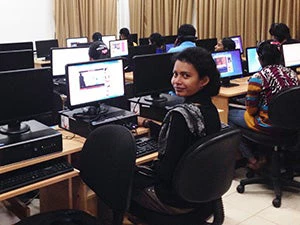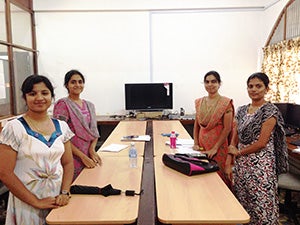
The first woman that I met was a young Information Communications Technology (ICT) training teacher, Kamani Samarasinghe, from the University of the Visual & Performing Arts. She creatively taught her class (both regular university classes and distance learning classes) through integrating a career development course into an ICT skills development class, holding virtual training sessions connecting with professor Ramesh Sharma from Indira Gandhi National Open University, and leveraging various free open education resources into her training such as YouTube videos and free typing training courses like GoodTyping. She also creates various tutorial materials (how to search, how to use Google Drive, and etc) on Google Doc and share with students.
 However, Kamani demonstrated something different. When she showed me how she teaches and learns new pedagogy, I could see Kamani, an entrepreneurial and creative teacher, will be able to transform the way to teach ICT skills and expose students with various potentials using ICT skills.
However, Kamani demonstrated something different. When she showed me how she teaches and learns new pedagogy, I could see Kamani, an entrepreneurial and creative teacher, will be able to transform the way to teach ICT skills and expose students with various potentials using ICT skills.
Kamani herself is a very proactive teacher, who has a mind of continuously learning new ways of teaching, utilizing available online education resources. For instance, she participated in a few online-based free Learning4Content workshops, including “Learn Wiki Skills for leveraging the potential of Open Educational Resources” held by Wikipedia to learn about online content creation. She also got awarded as a WikiEducator User Page Expo winner for July 2013.
In the Higher Education for the Twenty-First Century project, ICT skills training falls under the second project component, which is to promote relevance and quality of teaching and learning through providing two competitive and non-competitive grants to universities. All universities received grants to conduct ICT skills development training at least for six months for the first year students and students take an ICT certificate test as a voluntary or mandatory basis depending on the school. ICT training package contains the following elements: fundamentals of computers; working with computers; word processing; spreadsheet management; database handling; electronic presentations; internet & communication and managing a computer. ICT training and test was conducted mainly for the first year students to assess their ability to use Microsoft office (Word, Excel, PowerPoint, Access) applications. Approximately 67% of 13,800 students who sat for the test had attained the required level of achievement. During the mission, the award ceremony for those who passed the test was held in Colombo. Private companies invited as opening speakers emphasized the importance of ICT skills for the future employees, making a lot of students recognize the value of the certificate. Also, being recognized for their achievement in front of 1,000 plus students at the hotel in Colombo, students got motivated to develop their ICT skills further.
As a part of the ICT training provided under the project, Kamani taught her classes. The great thing about her teaching style was to embed ICT training into teaching subjects and developing soft skills. She taught first-year students how to use Google Drive and asked students to write about their future ambition and what skills and qualifications are needed for them to achieve their goals in Google Spreadsheet as a “Career Pathway Planning” activity. Through this exercise, students clarified their career goal and had a chance to strategically think about which courses to take and which activities to participate during their academic life to achieve their goals. In addition, they mastered how to use Google Drive, how to share documents, and how to manage data. This exercise itself automatically created a database of the first-year students, which could be used for taking surveys to assess various aspects of students learning process in the future.
The second women that I met were four female computer science major exchange students from Eastern University studying at Jaffna University. These two universities are less developed than other universities, and through the HETC project, new computer labs were built there. The majority of girls, especially from the rural area, usually opt for the government job. However, these girls that I met told me passionately that they want to get a job in private sector and they appreciate the opportunity to study as exchange students at Jaffna University where more and better ICT facilities are available.
I was encouraged to hear from these students as the HETC project could contribute to skill-up these female students and provided them with motivation to go beyond the traditional career path taught by their parents and the society.
Photo Caption 1: Computer lab at the University of the Visual & Performing Arts – Saori Imaizumi
Photo Caption 2: 4 female students from Eastern University studying as exchange students at Jaffna University – Saori Imaizumi


Join the Conversation